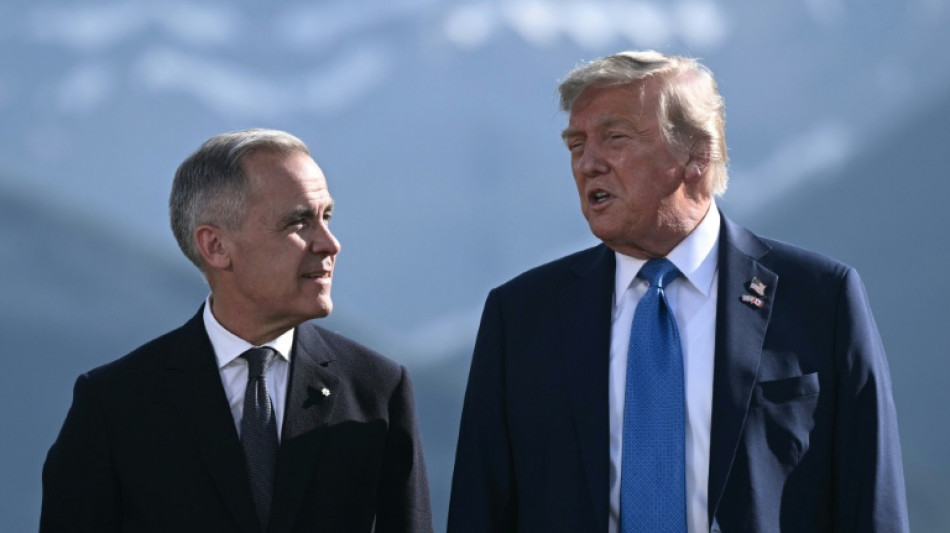

Trump ends all Canada trade talks over 'fake' tariff ad
US President Donald Trump on Friday doubled down on ending trade talks with Canada over an anti-tariff advertising campaign, as Prime Minister Mark Carney sought to downplay the sudden rupture.
On his Truth Social network, Trump said he had "terminated" all talks and vented fury at what he called a "fake" ad that he said misquoted former president Ronald Reagan discussing tariff policy.
Trump said the campaign -- produced by the Canadian province of Ontario for US television -- was designed to "interfere with the decision of the US Supreme Court," which is due to rule on his sweeping global tariffs.
"CANADA CHEATED AND GOT CAUGHT!!!" he posted Friday. "Canada has long cheated on Tariffs, charging our farmers as much as 400%. Now they, and other countries, can't take advantage of the U.S. any longer."
Carney did not directly respond to Trump's move, instead only saying recent talks had made progress "and we stand ready to pick up on that progress and build on that progress when the Americans are ready."
Canada has "to focus on what we can control, and realize what we cannot control," he added.
Trump wrote that "the Ronald Reagan Foundation has just announced that Canada has fraudulently used an advertisement, which is FAKE, featuring Ronald Reagan speaking negatively about Tariffs."
He reiterated that in his Friday post, writing that Reagan "LOVED TARIFFS FOR OUR COUNTRY, AND ITS NATIONAL SECURITY."
The foundation wrote on X that the Ontario government had used "selective audio and video" from a radio address on trade that Reagan delivered in 1987.
It said the ad misrepresented what the former Republican president said, adding that it was "reviewing its legal options."
The ad used quotes from Reagan's speech, in which he warned against ramifications that he said high tariffs on foreign imports could have on the US economy.
It cited Reagan as saying that "high tariffs inevitably lead to retaliation by foreign countries and the triggering of fierce trade wars," a quote that matches a transcript of his speech on the Ronald Reagan Presidential Library's website.
- Steel, aluminum, autos -
The latest twist in relations between the United States and Canada came just over two weeks after Carney visited Trump at the White House to seek a relaxation of stiff US tariffs.
At that meeting, Trump described Carney as a "world-class leader" and said the Canadian would "walk away very happy" from their discussion.
Trump's global sectoral tariffs -- particularly on steel, aluminum, and autos -- have hit Canada hard, forcing job losses and squeezing businesses.
For now, the United States and Canada adhere to an existing North American trade deal called the USMCA, which ensures that roughly 85 percent of cross-border trade in both directions remains tariff-free.
In a speech on Wednesday, Carney said that the United States has raised "its tariffs to levels last seen during the Great Depression."
"Our economic strategy needs to change dramatically," Carney added, saying the process "will take some sacrifices and some time."
On Friday, Kevin Hassett, director of the White House National Economic Council, told reporters that Canada had been "very difficult to negotiate with" and that "frustration has built up over time" for the president.
Both Trump and the Canadian prime minister are due to attend gatherings in the coming days -- a summit of Southeast Asian nations (ASEAN) in Malaysia and the Asia-Pacific Economic Cooperation (APEC) Forum in South Korea.
Carney has said his government is focused on preserving the USMCA, which was signed during Trump's first term and is scheduled for review in 2026.
While most cross-border food trade has remained tariff-free, some US tariffs and Canadian countermeasures have forced some suppliers to raise prices. Canadian grocery stores have historically relied heavily on US imports.
P.Vincenze--GdR

